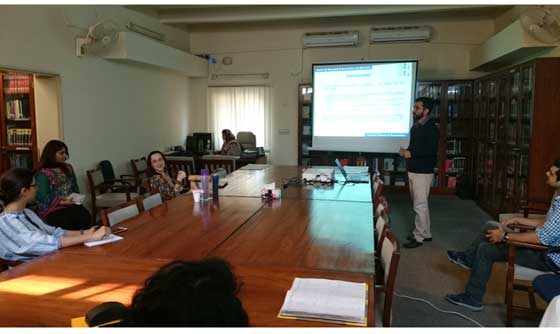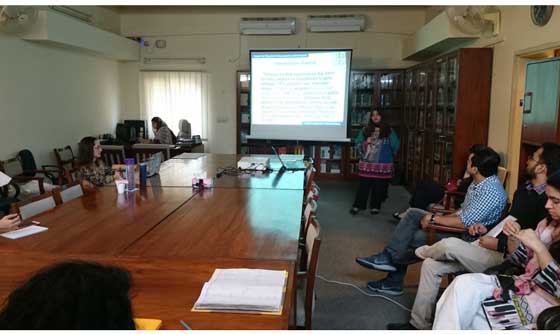 | Department of Economics |
| NEWS & MEDIA |
NEWS
Economics Faculty Research Paper Presentations
Economics Faculty Research Paper Presentation were held on 8th November, 2018. Ringchan Ali and Saniya Jilani presented their MPhil research (abstracts given below).

Impact of Remoteness on Student Learning Outcomes in Pakistan
Ringchan Ali
Abstract
This paper explores the relationship between school remoteness and the student learning outcomes. Existing literature focuses on the impact of remoteness on socio-economic conditions. However, evidence on the direct impact of remoteness on learning outcomes is rare. The paper investigates how distance of the school from district headquarters affects the quality of education provided in a school. This paper contributes to literatures by uniquely identifying two channels through which remoteness can impact student learning outcomes i.e. teacher's attendance and school infrastructure that can be affected by weak state capacity over larger distances. Data on standardized test scores, school infrastructure and school location from Annual Status of Education Report (ASER 2016). In addition, the Punjab School Census 2016 for geo locating government schools and Programme Monitoring and Implementation Unit (PMIU) for data on teacher's attendance in public schools is used. Results of this study can help inform policy decisions to reduce educational inequities arising from remoteness in rural areas.

Adverse Shocks to Education: The Case of Terrorism in Pakistan
Saniya Jilani
Abstract
Adverse shocks are known to bring forth unrest in the most vulnerable communities. These negative stimuli have been associated with reducing the educational and health spending thus, restricting the development of a society. Over the course of many years, the long term impact of terrorism on a society can be gauged through the level of human capital. In the early 1970s, David A. Wise (1975) established that better educational outcomes result in a productive labor force and consequently, in economic progress. As the war against terrorism wages on in Pakistan, the cost of war has not curbed; the impact has spread into areas of trade, tourism and most noticeably, education. The evidence of grave loss can be found in the statistics compiled by the Pakistan Ministry of Finance where the accumulation of losses from 2016-18 are US $7543 million (Ministry of Finance, 2015). Furthermore, by infringing upon the right to education, extremists have stimulated the gender gap in this sector. Therefore, this thesis will provide an empirical insight into the influence of adverse shocks on the learning outcomes for children in Pakistan between 2013 till 2016 using GTD and ASER. Here, I will employ the Hurdle model to account for the selection bias that arises due to the type of students who are enrolled in schools. This paper adds to the existing literature firstly by looking at learning outcomes as the dependent variable of interest and secondly, by employing a new technique; the hurdle model.
 People
People